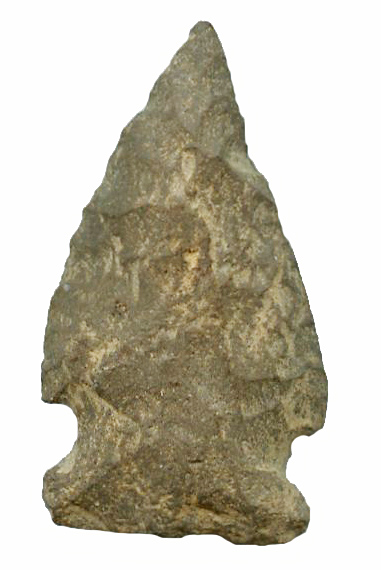
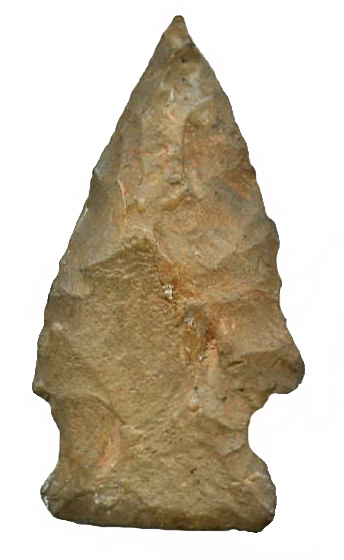
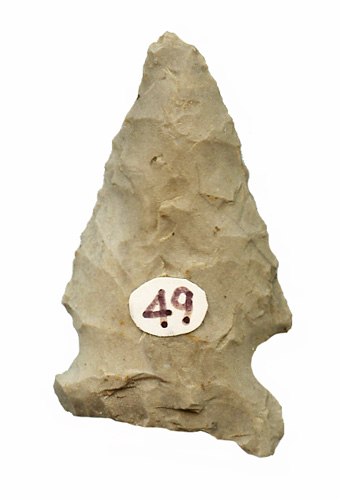
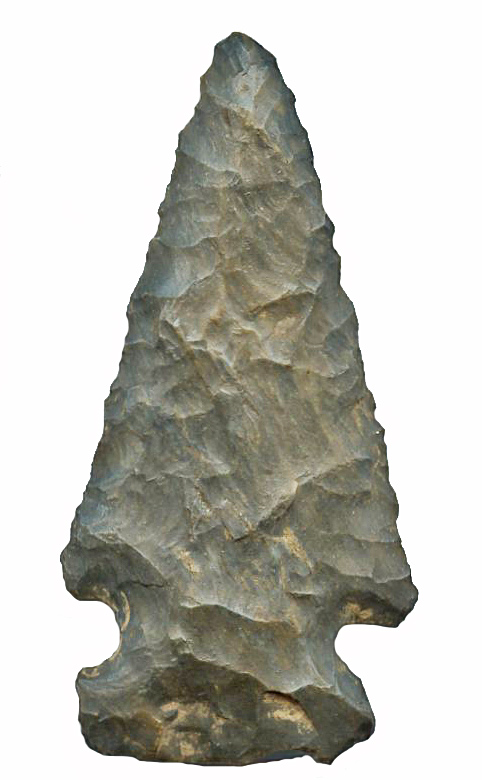




- More Points Pictured Below -
Point Type: BREWERTON
SIDE NOTCHED
Also See: Big Sandy Side Notched, Black Sand Notched, Brewerton Corner Notched
,Meadowood, Otter Creek, Perkiomen ,
Susquehanna Broad, Vosberg
Location: Eastern to Midwestern United States
Associated Dates: 5000 - 3500 B.P. - Late Archaic
Morphology: Side
Notched
General Description: The
Brewerton Side Notched is one of four types (Corner Notched, Eared
Notched, Eared Triangle, Side Notched) in the Brewerton family of points.
The Brewerton Side Notched is a broad, thick, side notched point,
predominantly of medium size. The blade is
trianguloid in outline,
biconvex in
cross section, blade edges are
slightly
excurvate, less often straight and rarely
incurvate. In rare instances
the blade edges are faintly serrated. The side notched stem (occasionally found with dual notches) is basally expanded,
sometimes to a pronounced degree, resulting in lateral projections or "ears". The base is
typically straight, slightly convex or less often mildly concave. About
two-thirds of all specimens have the base ground
smooth.
The size of the Brewerton Side
Notch ranges from 21 mm to 99 mm in
length. The majority of points fall between 32 mm and 57 mm. The thickness ranges
between 6 mm and 13 mm with the majority being between 8
mm and 9.5 mm.
The Brewerton Side Notched point
is the most common point of all the Archaic Laurentian
complexes in New York
State. The distribution of the point type ranges from New York, New
England, Pennsylvania and the Upper Ohio Valley. It is also found in
southern Ontario.
The point was first named the "side notched
points" by William A. Ritchie in 1940 and then later named "broad side notched
points" in later reports by Ritchie. The point was named the Brewerton
Side Notched point by Ritchie in 1961.
Ritchie felt that the Brewerton Side Notched
points, were for
the most part used as javelin dart heads with the larger specimens used as spear
points while the smaller variety could have possibly been used as arrow
points however unlikely. Some of the more convex edged specimens,
especially those with short blades were likely knives. Blade edge
rework may account for some of the short bladed
examples and the resharpening process would accentuate the proportions of the
base.
For the most part,
these points appear to have been manufactured by
percussion chipping from
local lithic materials such as flints, cherts and quartz. However the
lithic preference as far as material seems to be flint, chert, argillaceous shale, chalcedony, quartzite , shale and quartz.
Pressure flaking
to produce a sharp retouched blade edge is common.
The Brewerton
Side Notched type is probably related to the Otter Creek point type and the
Black Sand Notched point type, the Big Sandy Side-Notched point type.
Ritchie postulated that the Brewerton Side Notched type was genetically related
to other very old and widely-distributed, side-notched North American
projectile points. Perino suggests that the Vosberg point type is a
variant.
About The Point Above (Left): The
beautiful
and small Brewerton Side Notched point pictured at the top left
side of this page, was a surface find along the Susquehanna River, near Berwick,
Luzerne Co., Pennsylvania. It is made from a weathered indurated dark grey
shale. It is highly patinated and much of the field dirt, still remains on the point. One blade edge
is convex while the other blade edge has been reworked into a more straight outline. The historic remains of a ding,
near the tip probably caused the blade rework.
The basal area is heavily ground. The edges and point are still quite
sharp. Overall, the point measures 44 mm in length, is 25 mm wide (at the barbs) and is 7.7 mm thick at its thickest point. The stem measures 23.2 mm in
width and is 10.7 mm long. Catalog Number 242-20-M
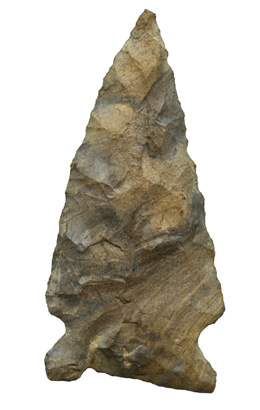
References: DeRegnaucourt, Dragoo (b,e), Fogleman, Hranicky (1, 2), Justice (1), Kinsey, Overstreet, Perino (1), Ritchie
© Copyright 1997 - 2009 LITHICS-Net WWW.LITHICSNET.COM
Use your Browser's BACK Button to return to the LITHICS-Net Index.